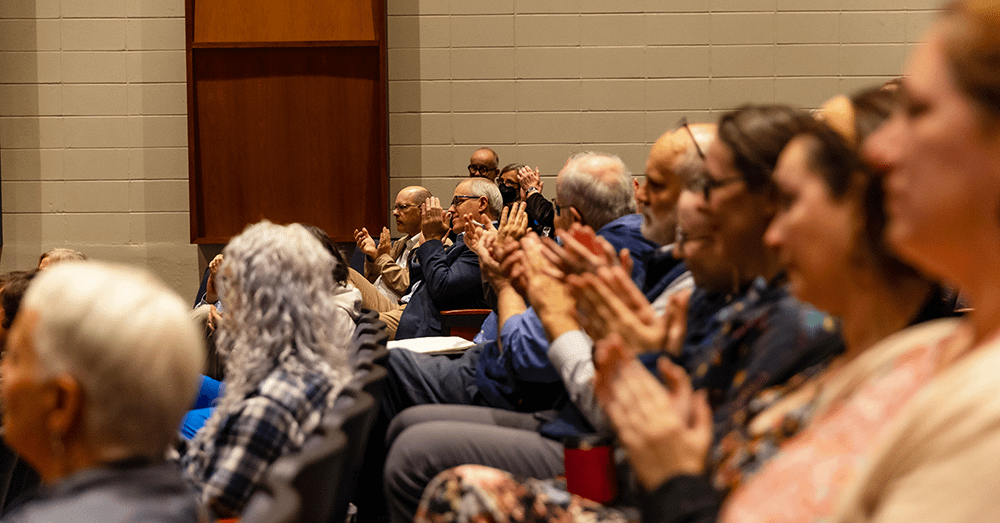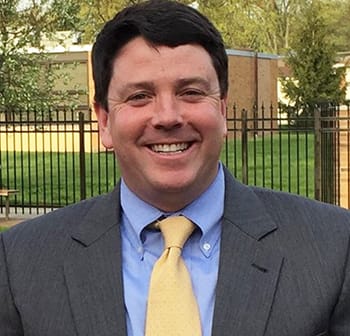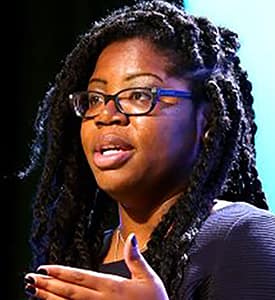Let’s get real, but stay hopeful, MLK speakers suggest
Voices of Monday’s 25th Martin Luther King Jr. Society Convocation in the Saint Michael’s College chapel rejected words and attitudes about history and modern times that might feel good, but avoid difficult realities of our lived experiences in the world, nation and on campus.
The time has come to move beyond popular culture’s too-common “Santa Claus” Dr. King, suggested Keynote speaker Rev. Nyle Fort — beyond a King whose carefully-vetted quotes about brotherhood at such occasions, minus fuller context, too easily diminish into “kumbaya … lullabies sung by defenders of the status quo.”
Advancing Fort’s ideas and making them local, Saint Michael’s staff and student speakers spelled out present challenges they feel have been raised by first-semester campus incidents of hate and intimidation – incidents that led to questioning by some community members about the speed and adequacy of the administration response so all students will feel safe and welcome.
Alongside Fort, community members from all corners of last semester’s post-U.S.-presidential-election campus tensions seemed to reach for common spiritual bedrock as the surest way to brace and advance constructively in today’s political climate.
Fort noted that he, like Dr. King, springs from a church tradition that informs a Gospel-rooted world view of brotherhood and active engagement in the world. President Jack Neuhauser referenced the noble history and values of the College’s founding Edmundite priests in the civil rights fight — as did several later speakers, who asserted that such values need to be lived in the present — not just remembered as history — lest they lose their savor. The president emphasized the symbolic importance of holding Monday’s nearly two-hour program in the Chapel, as has been tradition over the past quarter-century:
“We are, after all, a community that has at the core of its very existence the belief that a single life rooted in love for others can make a difference for all people,” Neuhauser said. “We should not overlook that the importance of this gathering is signified for our community by the very place in which we gather, a chapel where our most fundamental traditions are celebrated. This is holy ground for us. We come here to acknowledge that justice must be done because it is fundamental to whom we are as a community. The fact that we are here in this space and not somewhere else on this campus is a tangible acknowledgement that the basic tenet of who we are, is the acknowledgement of the dignity owed simply because we are a human person. All other virtues and precepts and vision must stem from this acknowledgement for each human person. Mercy and love only can only exist in a world that is just.”
The Uncomfortable Christ and Father Mike
Similarly tapping the spiritual in his speech, Moise St. Louis, associate dean of students and director of the Center for Multicultural Affairs, borrowed the provocative theme of “The Uncomfortable Christ” from a celebrated 1965 sermon by late civil-rights activist Edmundite priest, Fr. Maurice Ouellet, SSE. In extended and impassioned remarks, St. Louis honored (and held out as an example to imitate) the engaged personal humanity and justice-serving activism lived daily by his late friend, Edmundite Fr. Mike Cronogue, whose sudden death in October shook the community. Monday’s program was dedicated to Cronogue.
“He was not perfect, but he was decent and kind,” St. Louis said. “He didn’t always understand everything, but he always tried to understand.” St. Louis asked audience members to stand if they were touched by Cronogue’s life in a list of different ways, and nearly all present soon were on their feet.
Ouellet in 1965 had spoken of seeing that “uncomfortable Christ” in the oppressed and scared people he encountered in his civil rights work in Selma, AL, and beyond; St. Louis built on the powerful image, as experienced today: “The face of the uncomfortable Christ is all around us – in our society, in our neighborhood…here on our campus, in our classrooms, our residence halls … and we see it in our friends as they struggle for acceptance and support for recognition,” St. Louis said — and the question remains, “what have we done? What will we do?” He suggested using Father Mike’s legacy “as a vehicle to stop hate both in our community and our society … because we can, and because we must. Decency mandates it! Compassion requires it! Our own humanity needs it!”
Another convocation speaker, Melanie Castillo, an MLK Society officer, told of her student experiences as daughter of Dominican immigrants and described how last semester’s incidents made her feel – “I represent the fear of so many people” — and her conviction, now more than ever, to “never remain silent in the face of oppression.”
Speaker: Remember the King of history
Keynote speaker Fort reminded the hundreds of students, faculty, staff and wider community members in attendance that the Dr. King of history was a revolutionary, politically-engaged internationalist who could be uncomfortable to hear, to the point that the FBI director once called him the most dangerous man in America.
“Don’t use this holiday as a way of disremembering,” Fort said, using statistics to dramatize modern issues of police brutality and poverty, societal “phobias’ and harassment against Muslims or transgender people and others; and, internationally, the death of 400,000 Syrians and the plight of Palestinians. “Let’s remember them too – extend the dream beyond just our borders,” he said — as surely King would have done if alive today. We need first “to start with the underside of that dream,” he said, namely the “nightmare” out of which came eventual action to bring change. “We have some making up to do,” said Fort.
Speaking after the keynoter, Kimoi Seale of the Student Life staff shared with a touching vulnerable honesty his personal experiences of both racism and supportive community as a student and staff leader over many years. He honored those he considers brave students who last semester took action with demonstrations to address ugly campus incidents in the days and weeks following the national election. “Today’s students have silently carried the burden [of campus racism]– often with a smile. The difference between then [Seale’s student days] and now is that they and their friends have spoken out. They recognized the risk of silence on their state of mind and their ability to be successful students.”
Seale, like others, spoke of the Edmundites’ civil rights legacy and the imperative of making that legacy more than just words and memories. “It’s not enough for us as community to speak of siding with justice 50 years ago and ignore injustice now! What does that history matter if we fail to address the current acts of injustice in our own community?” he asked.
During the Convocation’s introductions, St. Louis had said that such story-sharing as exemplified by Seale’s openness has been a gift from faculty and staff members, who recently wrote a “common text” of reflections about their personal experiences of racism in Vermont and at Saint Michael’s so others might better understand what that feels like on an individual human level. It was part of extensive preparations for a week of reflection that were under way even while most of campus was on break, St. Louis said.
A full community effort
Others on the convocation program were Manuela Yeboah, MLK Society co-president, who introduced Rev. Fort — and shared smiles with him as she made note of their common New Jersey roots; musically, Jerome Monachino, campus minister, jazz-guitar virtuoso and director of the Liturgical Choir, played reflective pieces and accompanied Fr. Ray Doherty, SSE, and others in singing “Amazing Grace” to open. Later, a vocal trio of Dr. Sajida Jalalzai, Yeboah and Brianna Lambert-Jenkins sang a beautiful a cappella version of the classic piece “Lift Every Voice and Sing.” The closing song was the spiritual “This Little Light of Mine” accompanied by Monachino, with the audience holding lighted candles. Nga Nguyen of the MLK Society read the “Pledge of Nonviolence and & Social Justice”; and remarks from Carlos Villa, MLK Society treasurer, closed the program.
During a luncheon talk to faculty and staff earlier in the day, Fort noted he was making his fifth MLK-related talk in the past five days. Like others, he used his personal story to open eyes on the matters of the day, describing growing up around Orange, NJ, and attending a nearly all-white high school after early years in a predominantly black neighborhood, before heading to the historically black Morehouse College that King also attended – “the heart of black education.”
“I learned of the complexity of black lives” at Morehouse, he said, noting that, too often, narratives of black lives “are reduced to tropes.” Presently, Fort — a minister since age 16 – is working on a doctorate in divinity at Princeton. Given his academic interests, he hopes to help “break down that binary between social action and the life of the mind,” he said, explaining, “Ideas have material consequences on the lives of actual people.” A major point in his remarks was that “diversity is not the same as justice – the plantation was a diverse space.” He also said, “We must give up the myth of objectivity,” given that all teaching comes from a point of view, mostly a Euro-centric construct in most U.S. schools. “There’s really not a neutral place to teach from. Let’s be honest about that,” he said.
“Education is about who we see ourselves it be,” Fort continued, and is “inherently moral work … What kind of human beings do we want to graduate this kind of place? It’s a moral choice.” Between lunch and his main talk, Fort did an interview with a local TV station on the relevance of King’s message to the protests of recent weeks – it will air on Sunday morning on Local 44/22.
In his keynote, Fort called for shifting “from a service orientation to a justice orientation” – that is, “don’t just flip a coin to a beggar but see that a social system with beggars needs restructuring,” to paraphrase what King once said. His other key closing points were: Understand what King’s love was all about – “a force that eliminates the distance that oppression creates,” even though that typically doesn’t feel good. “But tell the truth. My mama tells me the truth because she loves me,” he said. “Are we willing to realize that the truth sometimes hurts, but it also will set us free?”
He said it also is vital to realize that King is just one among many freedom fighters — women and gay activists among them – who too often remain unknown at MLK events or in teaching and public discourse. “Democracy works off the efforts of ordinary people coming together and creating movements – not by Messiahs,” he said.
Fort ended with a King quote: “Will we live as family or perish as fools?”





